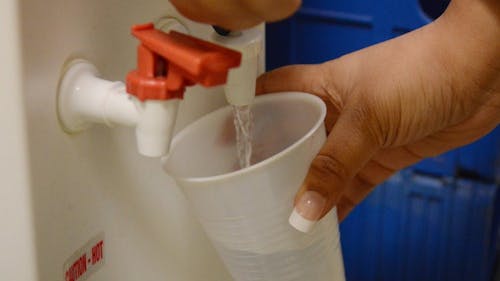Rutgers researchers find new solution for water contamination

This past year, Newark was among a number of cities across the United States to experience the negative effects of water contamination, according to NJ Advance Media. In November, a team of Rutgers University researchers announced the discovery of a new and effective way to detect and filter unclean water.
Led by Jing Li, a distinguished researcher and professor in the Department of Chemistry and Chemical Biology, the team found that certain highly porous luminescent crystalline materials can actually bind to toxins and heavy metals within water, trapping them and displaying the liquid’s drinkability. These crystals are known as luminescent-metal organic frameworks (LMOFs), she said.
“We use these materials for capturing or storing certain chemical species,” Li said.
Li said the project was inspired by the prevalence of contamination in both developing countries and in the United States.
The discovery is important for everybody, Li said. It could potentially impact the future of society.
“Having clean water is obviously extremely important for human health,” she said.
The research team has been working on similar projects for several years, Li said. An important aspect of their research was finding a material that could effectively detect explosive materials.
While the product is not ready to be commercialized and used on a large scale, Li said her team is working on making the materials available to the general population.
Figuring out how these materials can be recycled and utilized multiple times to increase cost effectiveness will be the next important step in the research process, she said.
“You do not want to use a material that does a one-time capture and then have to discard it," she said. "You want to use the same material many, many times."
This discovery is important for Rutgers students because it is important for general human health and society, Li said.
Nathan Rudd, a doctoral candidate in the Department of Chemistry and Chemical Biology, played an important role in the discovery of these materials.
Rudd said he was inspired to work on finding a means of detecting and filtering unclean water after watching the events that transpired in in Flint, Michigan.
“We deal with materials that we can functionalize in certain ways so we can modify them depending on what sort of interactions with contaminants we want to happen,” he said. “I investigated finding a material that was both water stable and could efficiently interact with the contaminants that we wanted.”
Lead and mercury are the two top contaminants of drinking water, Rudd said.
The team's discovery combined sensing toxins with filtering toxins, which was a big step forward, he said. Combining those materials helped lower the cost of detecting and cleaning water and simplified the process.
“There are these issues that have been problems for as far back as we can remember and it is nice to be able to contribute in some way to them,” Rudd said.
The discovery was a slow process, but Rudd said the lab environment became more exciting as their research progressed. Over the course of the experiment, the Rutgers researchers collaborated with scientists from the University of Texas, Rider University and other institutions, Rudd said.
Making an appliance that individuals can use on a large scale is "just down the pipeline," he said. But currently, the team is focusing on conquering other water toxins.
“The dream would be to have it incorporated in some type of membrane that water could flow through, kind of like a filter in your kitchen sink. That would be the end game,” Rudd said.
In today’s atmosphere where there are so many issues to be solved, Rudd said it is important to focus on what is best for the Earth in general.
Brittany Bernstein, a Bloustein School of Planning and Public Policy junior, said she is relieved that research like this is making progress.
Since she has experienced times when her water was discolored or had an unusual taste, she said she would feel safer if there was a way to ensure that her drinking water is clean.
“I believe it is very important to be able to detect clean water as the water may have harmful chemicals,” she said.
Bernstein said she believes research like this could have a great impact on the reputation of Rutgers University.
“Rutgers has been a research school for many years. New findings at Rutgers attract more researchers and more funding for the school to continue its research," she said.
Stephen Weiss is a School of Arts and Sciences sophomore majoring in philosophy. He is a correspondent with The Daily Targum.



